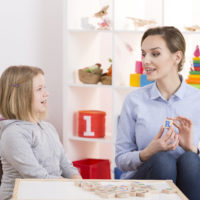School
-

FRIENDS programme reduced anxiety, but has no effect on school academic performance
Professor Paul Stallard and colleagues have analysed data from the randomised controlled trial “Preventing Anxiety in Children through Education in Schools” that involved >1,300 children aged 9-10 years from 40 primary schools across England.
Read more -

Getting help with parenting makes a difference – at any age
Parenting interventions for helping children with behavioural problems are just as effective in school age, as in younger children, according to new Oxford University research.
Read more -

In Conversation… Reducing mental health problems in schools
Dr Sophie Browning is a Consultant Clinical Psychologist working on whole school approaches to mental health. In this podcast with psychology journalist Jo Carlowe, she discusses an innovative cognitive behavioural therapy approach for reducing anxiety and mental health problems in schools. You can listen to this podcast on SoundCloud or iTunes.
Read more -

Back to school
“The government has recognised the need for greater focus on child and adolescent mental health and wellbeing, although is yet to provide adequate funding to match its rhetoric or a clear strategy for what in-school intervention would look like. Whilst early preventative programmes can be really useful for young people, I can’t help but think that the newly proposed in-school mental health initiatives might to some extent be treating problems created by the education culture that has been set up.”
Read more -

Promoting participation to improve mental health outcomes in children aged 11-13 years
This article is a summary of the paper published in CAMH – Tokolahi, E., Vandal, A. C., Kersten, P., Pearson, J., & Hocking, C. (2018). Cluster-randomised controlled trial of an occupational therapy intervention for children aged 11-13 years, designed to increase participation to prevent symptoms of mental illness.
Read more -

Place children and young people at the heart of the strategy – A recent call by a joint UK Select Committee
In their recent 1st joint Select Committee report, May 2018, the Education, Health and Social Care Committees call upon the government to take a stronger stance on child and adolescent mental health and to join up the appropriate services in a way that places children and young people at the heart of its strategy.
Read more -

Language stability in primary school-aged children hinders catch up for those with language disorders
In 2017, the Journal of Clinical Psychology and Psychiatry published the latest results of the Surrey Communication and Language in Education Study (SCALES), in which Courtenay Frazier Norbury and colleagues investigated language growth and stability in a population cohort of children with varying degrees of verbal and nonverbal cognitive abilities and a wide range of additional diagnoses.
Read more -

Intellectual Disabilities
Many terms have been used to describe an intellectual disability (ID) or medical conditions linked to an ID. Some terms that were originally designed to describe levels of intellectual disability or specific medical conditions, have unfortunately become part of common derogatory language used within society and so have become insults.
Read more -

In Conversation… Happiness in Schools
Dr John Ivens talks to ACAMH about the role of schools in mental health provision, the Government’s green paper on children and young people’s mental health, and assessing students’ experiences of happiness in schools in order to develop personalised approaches.
Read more -

The Bridge – Mental Health in Schools Issue
Welcome to this mental health in schools themed edition of the Bridge.
Read more